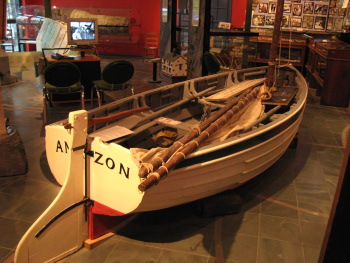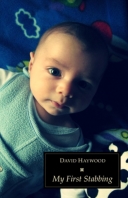"Is that an Australian accent?"
"New Zealand."
"Oh -- you're a Kiwi. I always think it must be funny coming from such a tiny island. How many times bigger is England than New Zealand, I wonder?"
"Well, in terms of land area, New Zealand is actually much larger than England. In fact, New Zealand is bigger than England, Scotland, Wales, and Northern Ireland all added together."
"Oh, so New Zealand's a really big country. I never knew."
No, it isn't. It's just that England is a really small country. But perhaps it's the last vestiges of empire that make it seem so much bigger in the minds of its inhabitants. I recently met a Canadian who told me he'd encountered similar astonishment when explaining that England was smaller than Canada.
We've been in Newcastle-Upon-Tyne for a few weeks now. On the one hand, it's always easy to settle into England. We speak the same language, find the same things amusing, even the landscape is similar. On the other hand, there's the English weather. Some days I've wondered why I bothered getting out of bed.
I recall an English uncle being surprised at what he termed the "height of the sky in New Zealand". He compared antipodean skies to a cathedral, whereas he thought that England had been built "with an old-fashioned nine-foot stud". For Newcastle, of course, you can shave a couple of feet off that.
Even on a rare sunny day, the Newcastle sky feels no higher than, say, 2.1 metres. In normal winter weather -- as drizzle trickles down your collar, and a clammy coldness seeps through your bones -- it's like being at the bottom of a coal mine. Throw a 3.30 pm sunset into the mix, and you've got a deeply depressing situation.
I've been sick ever since we arrived. Mediaevally sick. Last week, I coughed up something that wouldn't be out of place in an avant-garde seafood restaurant. I told Jennifer that I was now prepared for death, or -- at the very least -- to be transformed into one of those creatures you meet in science fiction films: half-man, half-mildew.
Jennifer suggested a winter holiday in the Lake District. The idea cheered me up no end. Apart from anything else, it would be an opportunity to catch up on the landscape of some of England's most interesting dead people: Wordsworth and Coleridge, Ruskin and Collingwood, and children's writers Arthur Ransome and Beatrix Potter.
A holiday also seemed like a good excuse for a haircut. The local barber was pleasantly horrified by our travel plans: "You can't go all the way to the Lake District for a weekend!" His incredulity managed to convey a British-Columbian who intends popping over to Newfoundland for morning tea. "It's right on the other side of the country, man." He paused dramatically. "It must be 90 miles away."
A car journey in England always makes me philosophical. I used to lecture on the subject of engineering history -- God forgive me -- and I'm well aware that England and Scotland are the home of the industrial revolution. The question is: where has it all gone now? Everywhere you look, the cities and the landscape are wholly devoid of industry. The only factories we saw on our travels turned out to be museums.
The answer, of course, is that England now has a service economy. The theory of this is simple: you sell me a hamburger, and I'll sell you a hamburger; and both our share prices will improve until we become fabulously rich. The only problem -- as those who've tried to post a letter via Royal Mail will realize -- is that it's doubtful that modern English people can cope with anything as technically challenging as selling a hamburger. They remind me a lot of the Portuguese. You find yourself perpetually astonished that they once managed to run an enormous empire.
I'd never been to the Lake District before, and predictably, it was much smaller than I'd imagined. Windermere, the largest lake in England, is only a fortieth the size of Lake Taupo (in fact, it's less than a third the size of Lake Coleridge, which I consider to be hardly more than a pond). Nevertheless, it's a very pleasant spot.
The landscape is widely touted as the most beautiful in England, although by New Zealand standards it's only averagely pretty. Its attractiveness is, however, notably enhanced by the farmhouses and cottages. I find that, by and large, domestic architecture in England has the same effect as make-up on a nondescript woman, who -- with a few clever dabs -- is transformed into a real looker. This is in sad contrast to New Zealand where, generally speaking, the houses are comparable to pustules on the face of a super-model. Mind you, the appeal of English housing only holds if you're not worried by living like a battery chicken.
Rain encouraged us to spend an hour or so in the Ruskin museum. As always, the museum missed out on the really interesting stuff -- such as the fact that Ruskin's five-year marriage was annulled because of his "incurable impotence". But it had some nice art by Collingwood, as well as a splendid first edition of 'Thorstein of the Mere'. The largest exhibit is a boat once belonging to Collingwood's grandchildren, and made famous by Arthur Ransome's 'Swallows and Amazons' novels.
Above: The original of 'Amazon' (click for larger image).
A break in the weather allowed us to wander along the shore of Coniston Water and dip our hands in the lake. Bob-the-baby enjoyed it so much that he had to be restrained from attempting full body immersion. We pottered about the countryside looking for somewhere to have lunch. The famous English fondness for children makes it difficult to find a watering-hole suitable for Bob; we've encountered several cafés emblazoned with "Children and Dogs Not Permitted" signs. It's also entirely legal, we've discovered, for shop-owners to eject mothers who are breastfeeding babies older than six months. Ah, those quaint English customs.
Dove Cottage, now a museum, was the place where Wordsworth banged out his most famous poem. It's a piece of writing that genuinely changed my life. I was enrolled in an English degree, and one day our tutor unexpectedly explained that 'I Wandered Lonely as a Cloud ' was not a piece about daffodils (as I'd previously thought), but rather a paean to Wordsworth's urination fetish. I suddenly realized my shortcomings in terms of literary analysis, and shortly thereafter transferred to Mechanical Engineering.
Jennifer and I both felt that Wordsworth's sister, Dorothy, had drawn the short straw in terms of sleeping accommodation. Her bedroom was like a fridge. I informed Jennifer that on the morning of Wordsworth's wedding, Dorothy was so upset that she stayed in her room, and refused to attend the ceremony. This, according to my English tutor, was the result of secretly wanting to shag her brother. Again, the museum was silent on this important fact.
The next morning, after preventing Bob-the-Baby from hurling himself into Windermere, we visited the oddly-named 'World of Beatrix Potter Attraction'. The town of Bowness was unbelievably busy. I'd spent the last few weeks wondering why on earth so many people were out and about -- but it was only at Bowness that I thought to figure the sums. We normally live in the South Island, where the population has just reached a million; England, smaller in area than the South Island, has a citizenry of 51 million. Fifty times busier, on average, seemed consistent with my observations.
Above: Bob dips his hand into Coniston Water (click for larger image).
The 'World of Beatrix Potter Attraction' had been recommended by an acquaintance, who'd described it as "impossible for children to dislike". The entry fee was the best part of NZ$50. Bob-the-baby examined the first attraction -- a large plastic rabbit. "No," he said decisively. Three minutes, and several-dozen negative opinions later, we emerged from the building with Bob leading the way at a sprint. It was an awfully fast way to part with money.
Bob was dead right, of course. The 'World of Beatrix Potter Attraction' is thoroughly ghastly. It's very lucky for them that Beatrix Potter is dead, because I'm sure she'd sue if she weren't (to give but one example, the shop sells a book entitled Peter Rabbit's 'I Love My Mommy').
After a stroll along the Bowness waterfront, we headed back home towards Newcastle.
Sitting on a packed motorway, I was reminded of another car journey. In my early twenties, I hitched a lift from Wellington to Auckland with a friend. He drove a mini, and contrived to invite four other friends along as well. We squished ourselves into the car like atoms inside a black hole.
The trip was an absolute nightmare. It wasn't that I disliked the mini as a car (it's brilliantly designed, and I'm a massive fan of Alec Issigonis). And it certainly wasn't that I disliked my fellow passengers (they were a great bunch). It's just that there were too many people in far too small a space. At the end of the day, I was awfully glad to leave.
The same, it seems to me, could perhaps be said of England.


